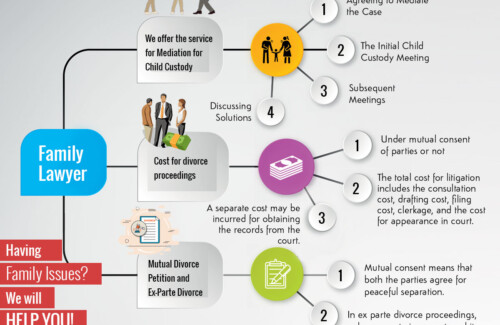
Family Lawyer
Please fill-up the form below and pay US $ 50 as Registration Charges
FAMILY LAWS – CASE HISTORY FORM
(to be filled-up by the client)
We offer the service for Mediation for Child Custody. We are also providing legal services for child support in Coimbatore and other cities in tamilnadu and India.
Being family attorneys, we are providing sterling service to NRIs and others on various issues involving Family Law Mediation, Family Court services, Mutual Divorce proceedings, NRI Divorce, Adoption legal proceedings, Legal consultancy for remarriage, Legal consultancy for any Personal issues, Family Separation proceedings, We are experienced in family law practice for over three decades conducting divorce cases on family laws all over India. We have family lawyers all over India for divorce and other cases.
The services of a family lawyer include consultation on all matters involving family laws in India and abroad. In India, the laws governing family matters depend on the religion to which the parties belong to. The law under which their marriage was registered also has an impact on the legal case they may file. Take for example, the family law where both the spouses are Hindus differs from they are Christians or any other religion. In the case of relief for divorce, mutual consent of parties is easier way for Hindus and Christians but not for Muslims.
Cost for divorce proceedings
Cost for divorce proceedings depend on where the case is filed and also the expertise of the lawyer whose service is engaged. Again it depends on whether it is filed under mutual consent of parties or not. If any interim relief is required, then additional cost may be incurred. The total cost for litigation includes the consultation cost, drafting cost, filing cost, clerkage, and the cost for appearance in court. A separate cost may be incurred for obtaining the records from the court. But all these details should be clearly agreed between the client and the lawyer. An estimate in this regard may be obtained from the lawyer or law firm concerned.
Mutual Divorce Petition and Ex-Parte Divorce
A timeline for the closure of proceeding in court in divorce matters or other family matters is often a tricky question. Going by the huge pendency of cases in Indian courts, inordinate delay may be expected. While the law for divorce by mutual consent in India for Hindus specify six months period from date of filing to get the divorce order, no specific time limit can be given in other matters. The Supreme Court of India has recently ruled that under certain conditions, even this six months period can be waived for granting divorce order. If the petitioner is lucky, if the opposite party is not appearing in the court even after receiving summons, the court may grant divorce order Ex-Parte within 3 months or so.
If the spouses have found that their marriage is irretrievably broken and peaceful re-union is not possible even after sincere efforts therefor, instead of quarrelling over petty issues in prolonged legal battles, they may put the past behind them and turnover to a new lease of life by calling it a day.
fundamental principle
An important issue to be resolved before taking a decision to divorce is the custody of the child. If not handled properly in the emotionally surcharged atmosphere, permanent damage may be caused not just to the spouses but to the child as well. Only in this background, Indian law on child custody has the fundamental principle of “the best interest and the welfare of the child”. This means that what ever the claim of the spouses who claim custody, the court will consider the circumstances which are favourable to the child before granting custody order to a spouse. This does not mean that the other spouse cannot meet the child at all. He or she can always apply for visitation right on specified days so that the relationship with the child can be maintained and nurtured. This may be called Joint custody or shared custody if the child is allow to stay with the other spouse for specified days.
Many people think if they are not willing to give their consent for divorce, the other party cannot get it ever. It is not so. Divorce law under Hindu, Christian and Muslim Laws state that if a spouse files a petition for divorce under any ground, if the court feels that the case is proved, it will pass a divorce order whether or not the other party objects to the divorce.
Reviews
Submit your review | |


